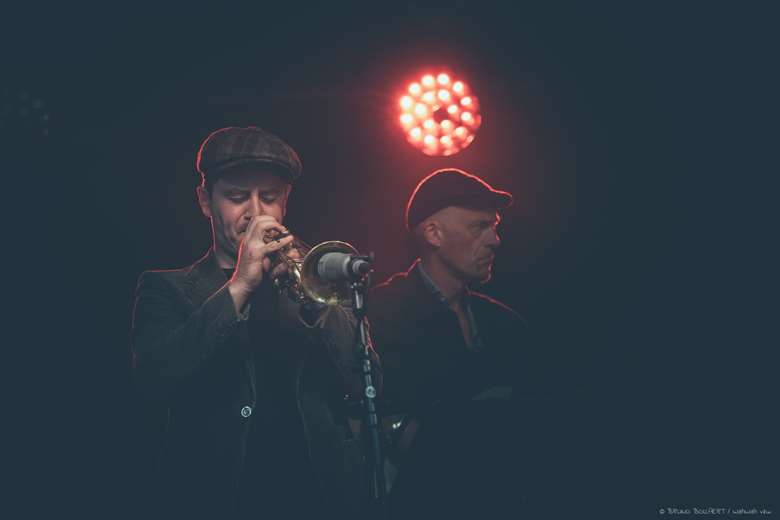Live Jazz boogies back at Belgium’s Gent Jazz 1.5
Martin Longley
Tuesday, July 21, 2020
Another European jazz festival makes a slight return with an outdoor event packed with local jazz heroes

Arranged at very short notice, after gaining permission from the city authorities, Belgium’s Gent Jazz Festival appeared phoenix-like, in a reconfigured post-lockdown shape. Its usual international aspect wasn’t possible, with Wynton Marsalis, Gary Bartz, Tigran Hamasyan, et cetera, no longer able to appear under the new spaced-out regulations. Like several other European festivals, line-ups of indigenous artists have emerged. Despite the new permission for outdoor performance in the UK, no promoters seem to be too bothered to organise any such events (at time of writing).
Using the grassy area of its secondary Garden Stage at Bijloke, a limit of 400 punters was ruled acceptable, sitting at tables across the expanse, with no masks needed when stationary, and all drinks and edibles distributed by servers. Permission granted for face-covered toilet-trips!
With several nights sold out, the artists still had to handle a less-huddled crowd, and it was drummer Antoine Pierre’s Urbex who best dealt with this situation during the three days that your scribe was in attendance. The new repertoire of Suspended was unveiled in its core-band incarnation, the live album due for release in September, and recorded by an expanded ensemble at the Brussels Jazz Festival last January. The spirit of the music remains similar, derived from the sound of Bitches Brew.
Guitarist Bert Cools upped his extrovert presence, now being the sole axeman onstage, playing with a bow, initiating a strong dynamic tension, as each piece developed. Urbex often rose from faintness to groove-ness, with trumpeter Jean-Paul Estiévenart wired out front, Cools making his guitar sound like a Moog, going avant-lounge, once getting his electro-effects fully geared. “Put a mask on and buy CDs,” was Pierre’s quote of the night.
Earlier, Nabou opened the proceedings, led by trombonist Nabou Claerhout, producing a 1970s-style fusion with an updated palette. Effects were frequently draped over the ‘bone, from echo-anthem to woolly guitar noodling. Much of their repertoire was slow-paced, but Claerhout broke up the set with a completely solo number, making a slow-breathing pillow for her own overlaid theme development, like a cosmic gravity-rotation whale-snore.
The next evening’s headliner was Commander Spoon, a more mainstream outfit, but still engaging with strength. A deep, bluesy groove evolved, with frontman Pierre Spataro maintaining a persistent tenor saxophone intensity. Reggae shimmers appeared, in a slow surf, with Florent Jeunieaux’s muted guitar excess leading an atonal, repetitive push, and ubiquitous Brussels bassman Fil Caporali also levering hard as the final stretch developed.
Just prior to the Spoons were Schntzl, a duo of Hendrik Lasure (keyboards) and Casper Van De Velde (drums), greatly hampered by the vocal chatter among the crowd. Schntzl played at a much quieter level than anticipated, which might have been their mistake, given the scale of this gig. They opened with a jaunty toytown ditty, keeping all of their tunes very tight and brief, with the feel of sketches. The pair issued faint girlie vocals at strategic moments, as ethereal piano probed a new genre of delicate chamber-strut. Organ and koto sounds floated around, as the sunset’s magic hour dappled the stage. Minimal disco appeared, with added whistling, the fidgety drums kept deliberately soft. Schntzl explored courageously low volume levels, as Bob James loomed over their climactic moments.
Two days before those sold-out shows, pianist Bram De Looze played solo piano, then reappeared for the next set by trio Pentadox. He made a brooding accumulation of key-tolling, stormy undercurrents before a scrabbling climb. At times De Looze’s set became like background cocktail music, but then he delivered a hard-nosed minimalist vamp. Again, there were problems with the extremely introverted nature of the set, plus the fact that it was very lengthy for a solo performance, the smaller crowd becoming quite restless.
Pentadox also preferred an inward-looking chamber jazz, De Looze joined by saxophonist Sylvain Debaisieux and drummer Samuel Ber. They had an itchy purity, with a bout of Tim Berne-oid cycling repetition, a robots-meet-organics character. Making a drone-blanketing interlude, they side-stepped to fluttering spaciousness, enjoying the feel of simultaneous composition and improvisation. Given that the full line-up of this Tuesday night was only announced a few days prior, the audience was at its smallest, so it would have been wise for the performers to add an extra dash of projection. As moves are made towards spaced-out attendees, artists will have to quickly learn a new scale of engagement with their audiences.